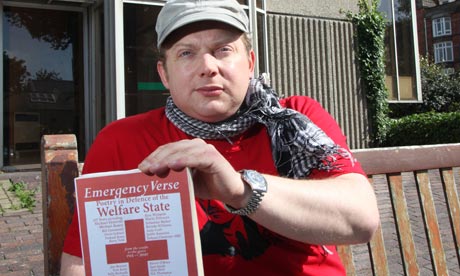
It's a familiar refrain among literary critics that British poetry has lost its polemical voice. But anyone lamenting the absence of "state of the nation" writing to challenge the prevailing political orthodoxy of austerity and hard-nosed welfare reform need despair no longer.
Children's laureate Michael Rosen, beat poet Michael Horovitz and dozens of other established writers, ranging from academic Ken Worpole to mental health campaigners Barry Tebb and Brenda Williams, are among the 100-plus contributors to Emergency Verse: an anthology of poems to be published online in protest at the coalition government's public spending cuts.
Boasting the personal endorsement of Green MP Caroline Lucas, the e-anthology will be mass-emailed to No 10 Downing Street and every Whitehall department this month, as civil servants grapple with Treasury demands for savings of up to 40%.
The collaboration has been organised by the Recusant, a radical webzine launched in 2007 to champion socially conscious writing and challenge what its founder, poet Alan Morrison, views as the prosaic concerns and conventions of Britain's contemporary literary establishment. To date, the site has attracted 300,000 visitors and submissions from countries as disparate as Australia, Iraq and Puerto Rico.
Morrison, 36, whose latest poetry volume, Keir Hardie Street, charts an odyssey through an imaginary utopian London, describes Emergency Verse as his "paper call to arms" over the "breakup" of the NHS and the "transparent unfairness" of George Osborne's emergency budget – which capped housing benefit and pegged future rises in welfare payments to the lower measure of inflation, the consumer price index.
"I felt it my duty to call on like-minded poets to join in a verse campaign against the emergency budget and in defence of the welfare state," he says. "Auden once said, 'Poetry makes nothing happen.' Audacious as it may sound, we're trying to prove poetry can make things happen. The power of words should not be underestimated: we need a Big Poetry to combat the Big Society, and I hope EV will help shape that fightback in verse."
Alongside its "bigger name" contributors, Emergency Verse boasts entries from writers who owe a personal debt to the welfare state. They include Peter Street, who overcame epilepsy and a crippling spinal injury to become a Royal Literary Fund-awarded poet, and John O'Donoghue, whose memoir, Sectioned: A Life Interrupted, won this year's Mind Book of the Year. O'Donoghue says his motives for contributing are the same as those that inspired Sectioned, which chronicles his 14-year oscillation between mental asylums, homeless hostels and prison: "I hope my memoir acts as a cautionary tale and that policymakers may read it and think of the human cost of their actions."
Worpole, who has contributed two poems he wrote in opposition to the social policies of the Thatcher and Blair governments, echoes these sentiments – likening Morrison's "activism" to "the work many of us were doing in community publishing in the 1970s".
• Emergency Verse: Poets in Defence of the Welfare State, published by Caparison, can be downloaded for £2.99 from www.therecusant.org.uk
• This article was amended on 2 September 2010. The original described John O'Donoghue's Sectioned: A Life Interrupted as an autobiographical novel. This has been corrected.

